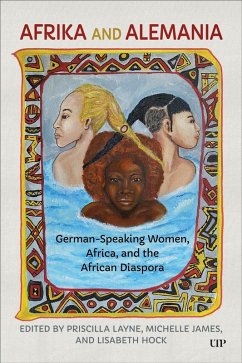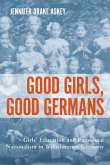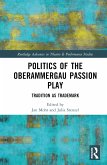Priscilla Layne, Michelle Stott James, Lisabeth Hock
Afrika and Alemania
German-Speaking Women, Africa, and the African Diaspora
Priscilla Layne, Michelle Stott James, Lisabeth Hock
Afrika and Alemania
German-Speaking Women, Africa, and the African Diaspora
- Gebundenes Buch
- Merkliste
- Auf die Merkliste
- Bewerten Bewerten
- Teilen
- Produkt teilen
- Produkterinnerung
- Produkterinnerung
This book examines how German-speaking women of diverse racial and ethnic backgrounds represent Africa and Blackness, foregrounding the challenges Black women face in defining and portraying Blackness, African identities, and Africa on their terms.
Andere Kunden interessierten sich auch für
![Good Girls, Good Germans Good Girls, Good Germans]() Jennifer Drake Jennifer Drake AskeyGood Girls, Good Germans115,99 €
Jennifer Drake Jennifer Drake AskeyGood Girls, Good Germans115,99 €![Great Books by German Women in the Age of Emotion, 1770-1820 Great Books by German Women in the Age of Emotion, 1770-1820]() Margaretmary DaleyGreat Books by German Women in the Age of Emotion, 1770-1820150,99 €
Margaretmary DaleyGreat Books by German Women in the Age of Emotion, 1770-1820150,99 €![Dimensions of Storytelling in German Literature and Beyond Dimensions of Storytelling in German Literature and Beyond]() Dimensions of Storytelling in German Literature and Beyond149,99 €
Dimensions of Storytelling in German Literature and Beyond149,99 €![Edinburgh German Yearbook 11 Edinburgh German Yearbook 11]() Edinburgh German Yearbook 1188,99 €
Edinburgh German Yearbook 1188,99 €![Edinburgh German Yearbook 10 Edinburgh German Yearbook 10]() Edinburgh German Yearbook 10127,99 €
Edinburgh German Yearbook 10127,99 €![Politics of the Oberammergau Passion Play Politics of the Oberammergau Passion Play]() Politics of the Oberammergau Passion Play177,99 €
Politics of the Oberammergau Passion Play177,99 €![Women Peasant Poets in Eighteenth-Century England, Scotland, and Germany Women Peasant Poets in Eighteenth-Century England, Scotland, and Germany]() Susanne KordWomen Peasant Poets in Eighteenth-Century England, Scotland, and Germany150,99 €
Susanne KordWomen Peasant Poets in Eighteenth-Century England, Scotland, and Germany150,99 €-
-
-
This book examines how German-speaking women of diverse racial and ethnic backgrounds represent Africa and Blackness, foregrounding the challenges Black women face in defining and portraying Blackness, African identities, and Africa on their terms.
Hinweis: Dieser Artikel kann nur an eine deutsche Lieferadresse ausgeliefert werden.
Hinweis: Dieser Artikel kann nur an eine deutsche Lieferadresse ausgeliefert werden.
Produktdetails
- Produktdetails
- Verlag: University of Toronto Press
- Seitenzahl: 296
- Erscheinungstermin: 15. Juni 2025
- Englisch
- Abmessung: 229mm x 152mm x 25mm
- ISBN-13: 9781487547356
- ISBN-10: 1487547358
- Artikelnr.: 73224871
- Herstellerkennzeichnung
- Libri GmbH
- Europaallee 1
- 36244 Bad Hersfeld
- gpsr@libri.de
- Verlag: University of Toronto Press
- Seitenzahl: 296
- Erscheinungstermin: 15. Juni 2025
- Englisch
- Abmessung: 229mm x 152mm x 25mm
- ISBN-13: 9781487547356
- ISBN-10: 1487547358
- Artikelnr.: 73224871
- Herstellerkennzeichnung
- Libri GmbH
- Europaallee 1
- 36244 Bad Hersfeld
- gpsr@libri.de
Edited by Priscilla Layne, Michelle James, and Lisabeth Hock
Contributors
Introduction: Blackness, Germany, and Representation
Lisabeth Hock, Priscilla Layne, and Michelle James
Part I: The Black Diaspora and Self-Definition
1. "They Are the Next Generation": An Interview with Sarah Blaßkiewitz
Priscilla Layne and Lisabeth Hock
2. Between Autofiction and the Archive: On/Travelling Olivia Wenzel’s 1,000
Coils of Fear (2020), Touching Tale or World Refracts Nation
Birgit Tautz
3. Postcolonial Ghana and the Legacy of Colonial Oppression in Amma Darko’s
Novels
Priscilla Layne
Part II: Non-Black POC, Africa, and the African Diaspora
4. "Eingangstor zum Afrika" (Gateway to Africa): The Reconfigurations of
Emily Ruete
Kate Roy
5. The Survivor as "Implicated Subject" in Stefanie Zweig’s
Autobiographical Africa Novels Nirgendwo in Afrika (Nowhere in Africa) and
Nirgendwo war Heimat: Mein Leben auf zwei Kontinenten (Nowhere Was Home: My
Life on Two Continents)
Sarah Henneböhl
6. Making the Invisible Visible? Representations of Black Masculinity in
Texts by Yoko Tawada
Lisabeth Hock
Part III: White Settler Colonialism and Its Legacies
7. German Cultural Superiority and Racial Hierarchy in Gabriele Reuter’s
Glück und Geld
David Tingey
8. The Black Slave Martyr Reimagined for Christian Missions in Colonial
Africa: Maria Theresa Ledóchowska’s Zaïda
Cindy Patey Brewer and Elizabeth Moye-Weaver
9. Rethinking the Periphery: Blackness in Eugenie Marlitt’s Im
Schillingshof (1879)
Beth Mullner
10. White Feminism and the Colonial Gaze: Frieda von Bülow’s Diaries from
German East Africa
Carola Daffner
11. Single White Female: Independent Women and Colonial Knowledge
Production in German Colonial Fiction
Maureen Gallagher
12. Colonial Propaganda Fiction: Else Steup’s Backfisch Novels from the
1930s
Julia K. Gruber
13. Perspectives on Namibia by Contemporary White German-Speaking Women
Authors
Lorely French
Index¿
Introduction: Blackness, Germany, and Representation
Lisabeth Hock, Priscilla Layne, and Michelle James
Part I: The Black Diaspora and Self-Definition
1. "They Are the Next Generation": An Interview with Sarah Blaßkiewitz
Priscilla Layne and Lisabeth Hock
2. Between Autofiction and the Archive: On/Travelling Olivia Wenzel’s 1,000
Coils of Fear (2020), Touching Tale or World Refracts Nation
Birgit Tautz
3. Postcolonial Ghana and the Legacy of Colonial Oppression in Amma Darko’s
Novels
Priscilla Layne
Part II: Non-Black POC, Africa, and the African Diaspora
4. "Eingangstor zum Afrika" (Gateway to Africa): The Reconfigurations of
Emily Ruete
Kate Roy
5. The Survivor as "Implicated Subject" in Stefanie Zweig’s
Autobiographical Africa Novels Nirgendwo in Afrika (Nowhere in Africa) and
Nirgendwo war Heimat: Mein Leben auf zwei Kontinenten (Nowhere Was Home: My
Life on Two Continents)
Sarah Henneböhl
6. Making the Invisible Visible? Representations of Black Masculinity in
Texts by Yoko Tawada
Lisabeth Hock
Part III: White Settler Colonialism and Its Legacies
7. German Cultural Superiority and Racial Hierarchy in Gabriele Reuter’s
Glück und Geld
David Tingey
8. The Black Slave Martyr Reimagined for Christian Missions in Colonial
Africa: Maria Theresa Ledóchowska’s Zaïda
Cindy Patey Brewer and Elizabeth Moye-Weaver
9. Rethinking the Periphery: Blackness in Eugenie Marlitt’s Im
Schillingshof (1879)
Beth Mullner
10. White Feminism and the Colonial Gaze: Frieda von Bülow’s Diaries from
German East Africa
Carola Daffner
11. Single White Female: Independent Women and Colonial Knowledge
Production in German Colonial Fiction
Maureen Gallagher
12. Colonial Propaganda Fiction: Else Steup’s Backfisch Novels from the
1930s
Julia K. Gruber
13. Perspectives on Namibia by Contemporary White German-Speaking Women
Authors
Lorely French
Index¿
Contributors
Introduction: Blackness, Germany, and Representation
Lisabeth Hock, Priscilla Layne, and Michelle James
Part I: The Black Diaspora and Self-Definition
1. "They Are the Next Generation": An Interview with Sarah Blaßkiewitz
Priscilla Layne and Lisabeth Hock
2. Between Autofiction and the Archive: On/Travelling Olivia Wenzel’s 1,000
Coils of Fear (2020), Touching Tale or World Refracts Nation
Birgit Tautz
3. Postcolonial Ghana and the Legacy of Colonial Oppression in Amma Darko’s
Novels
Priscilla Layne
Part II: Non-Black POC, Africa, and the African Diaspora
4. "Eingangstor zum Afrika" (Gateway to Africa): The Reconfigurations of
Emily Ruete
Kate Roy
5. The Survivor as "Implicated Subject" in Stefanie Zweig’s
Autobiographical Africa Novels Nirgendwo in Afrika (Nowhere in Africa) and
Nirgendwo war Heimat: Mein Leben auf zwei Kontinenten (Nowhere Was Home: My
Life on Two Continents)
Sarah Henneböhl
6. Making the Invisible Visible? Representations of Black Masculinity in
Texts by Yoko Tawada
Lisabeth Hock
Part III: White Settler Colonialism and Its Legacies
7. German Cultural Superiority and Racial Hierarchy in Gabriele Reuter’s
Glück und Geld
David Tingey
8. The Black Slave Martyr Reimagined for Christian Missions in Colonial
Africa: Maria Theresa Ledóchowska’s Zaïda
Cindy Patey Brewer and Elizabeth Moye-Weaver
9. Rethinking the Periphery: Blackness in Eugenie Marlitt’s Im
Schillingshof (1879)
Beth Mullner
10. White Feminism and the Colonial Gaze: Frieda von Bülow’s Diaries from
German East Africa
Carola Daffner
11. Single White Female: Independent Women and Colonial Knowledge
Production in German Colonial Fiction
Maureen Gallagher
12. Colonial Propaganda Fiction: Else Steup’s Backfisch Novels from the
1930s
Julia K. Gruber
13. Perspectives on Namibia by Contemporary White German-Speaking Women
Authors
Lorely French
Index¿
Introduction: Blackness, Germany, and Representation
Lisabeth Hock, Priscilla Layne, and Michelle James
Part I: The Black Diaspora and Self-Definition
1. "They Are the Next Generation": An Interview with Sarah Blaßkiewitz
Priscilla Layne and Lisabeth Hock
2. Between Autofiction and the Archive: On/Travelling Olivia Wenzel’s 1,000
Coils of Fear (2020), Touching Tale or World Refracts Nation
Birgit Tautz
3. Postcolonial Ghana and the Legacy of Colonial Oppression in Amma Darko’s
Novels
Priscilla Layne
Part II: Non-Black POC, Africa, and the African Diaspora
4. "Eingangstor zum Afrika" (Gateway to Africa): The Reconfigurations of
Emily Ruete
Kate Roy
5. The Survivor as "Implicated Subject" in Stefanie Zweig’s
Autobiographical Africa Novels Nirgendwo in Afrika (Nowhere in Africa) and
Nirgendwo war Heimat: Mein Leben auf zwei Kontinenten (Nowhere Was Home: My
Life on Two Continents)
Sarah Henneböhl
6. Making the Invisible Visible? Representations of Black Masculinity in
Texts by Yoko Tawada
Lisabeth Hock
Part III: White Settler Colonialism and Its Legacies
7. German Cultural Superiority and Racial Hierarchy in Gabriele Reuter’s
Glück und Geld
David Tingey
8. The Black Slave Martyr Reimagined for Christian Missions in Colonial
Africa: Maria Theresa Ledóchowska’s Zaïda
Cindy Patey Brewer and Elizabeth Moye-Weaver
9. Rethinking the Periphery: Blackness in Eugenie Marlitt’s Im
Schillingshof (1879)
Beth Mullner
10. White Feminism and the Colonial Gaze: Frieda von Bülow’s Diaries from
German East Africa
Carola Daffner
11. Single White Female: Independent Women and Colonial Knowledge
Production in German Colonial Fiction
Maureen Gallagher
12. Colonial Propaganda Fiction: Else Steup’s Backfisch Novels from the
1930s
Julia K. Gruber
13. Perspectives on Namibia by Contemporary White German-Speaking Women
Authors
Lorely French
Index¿








